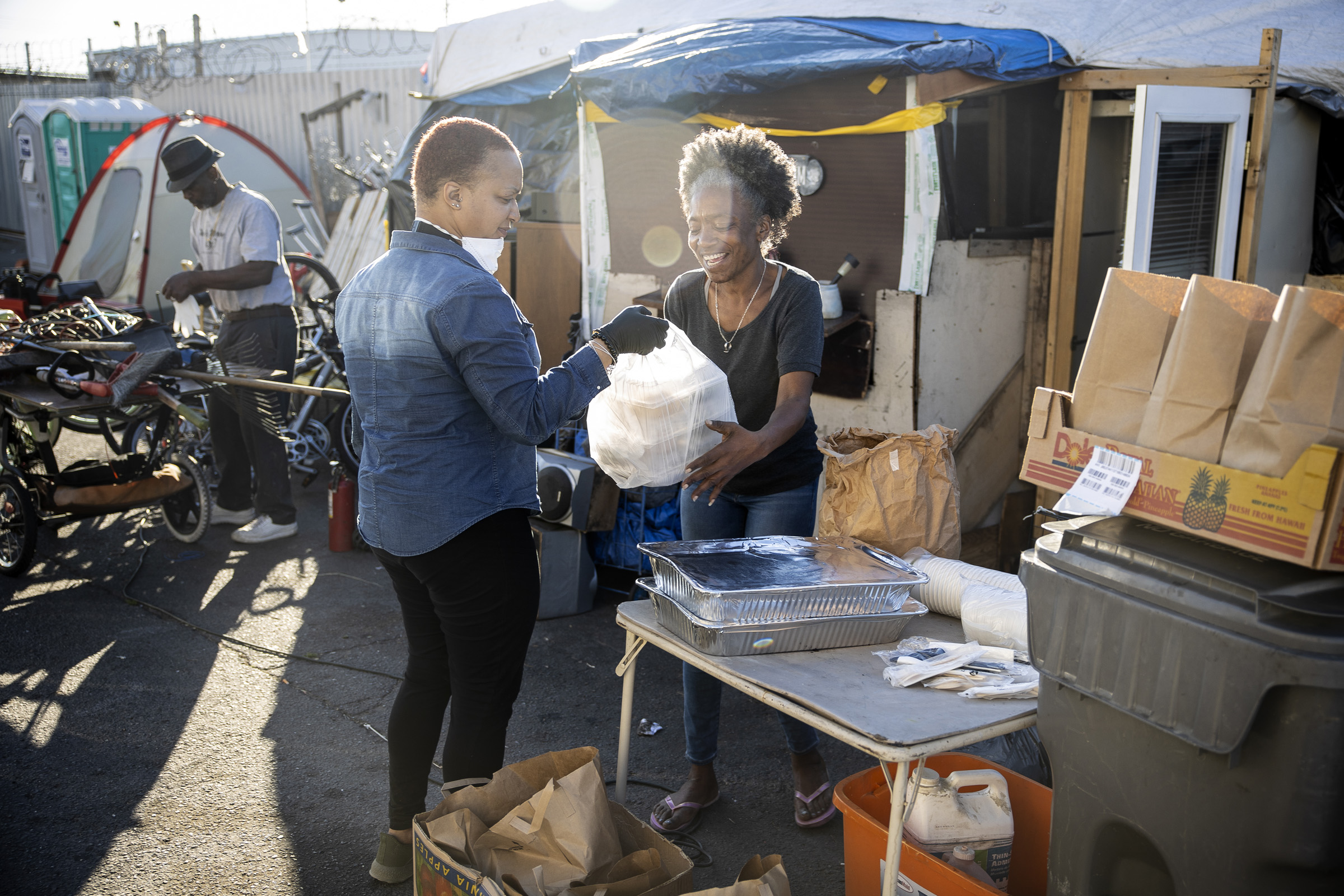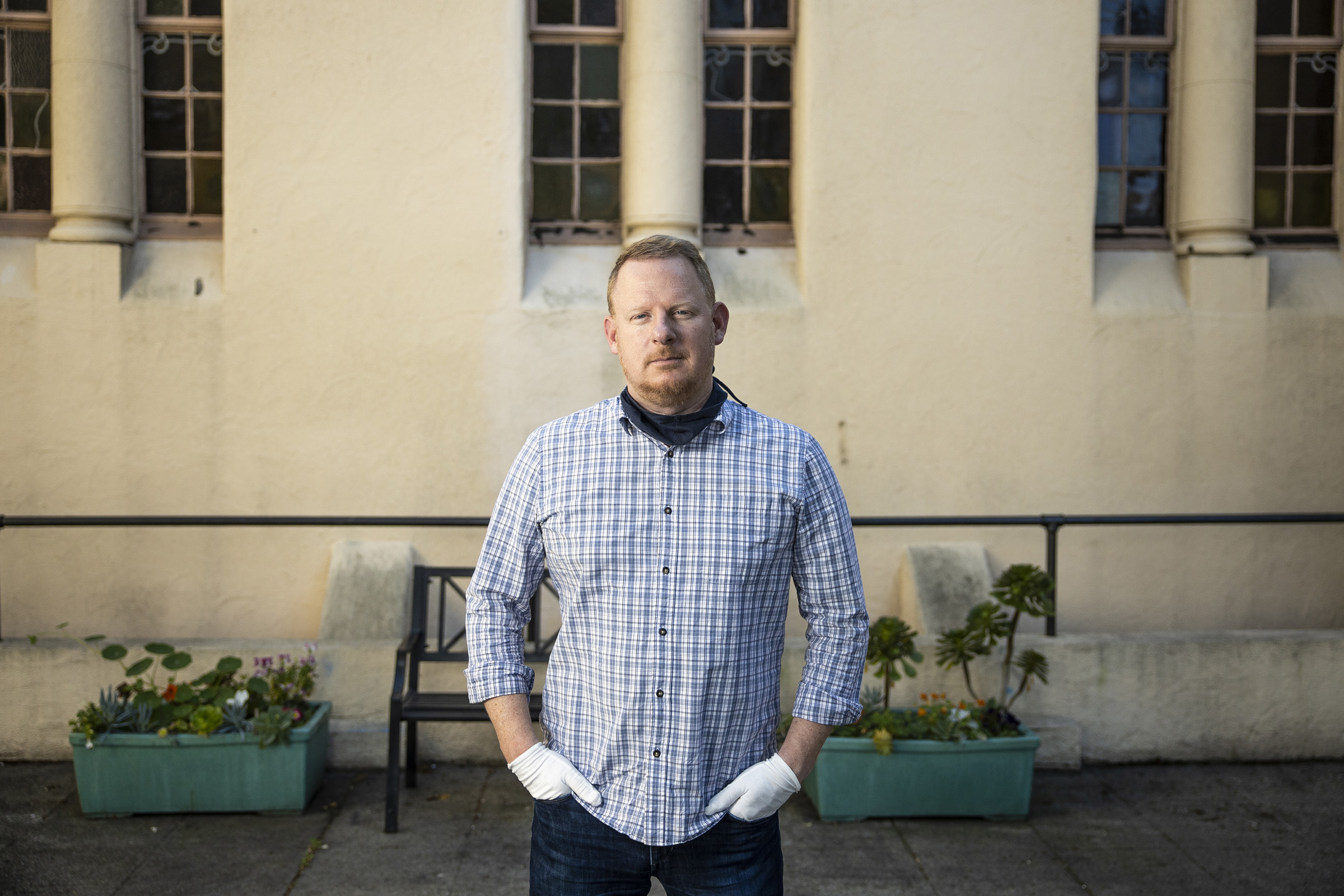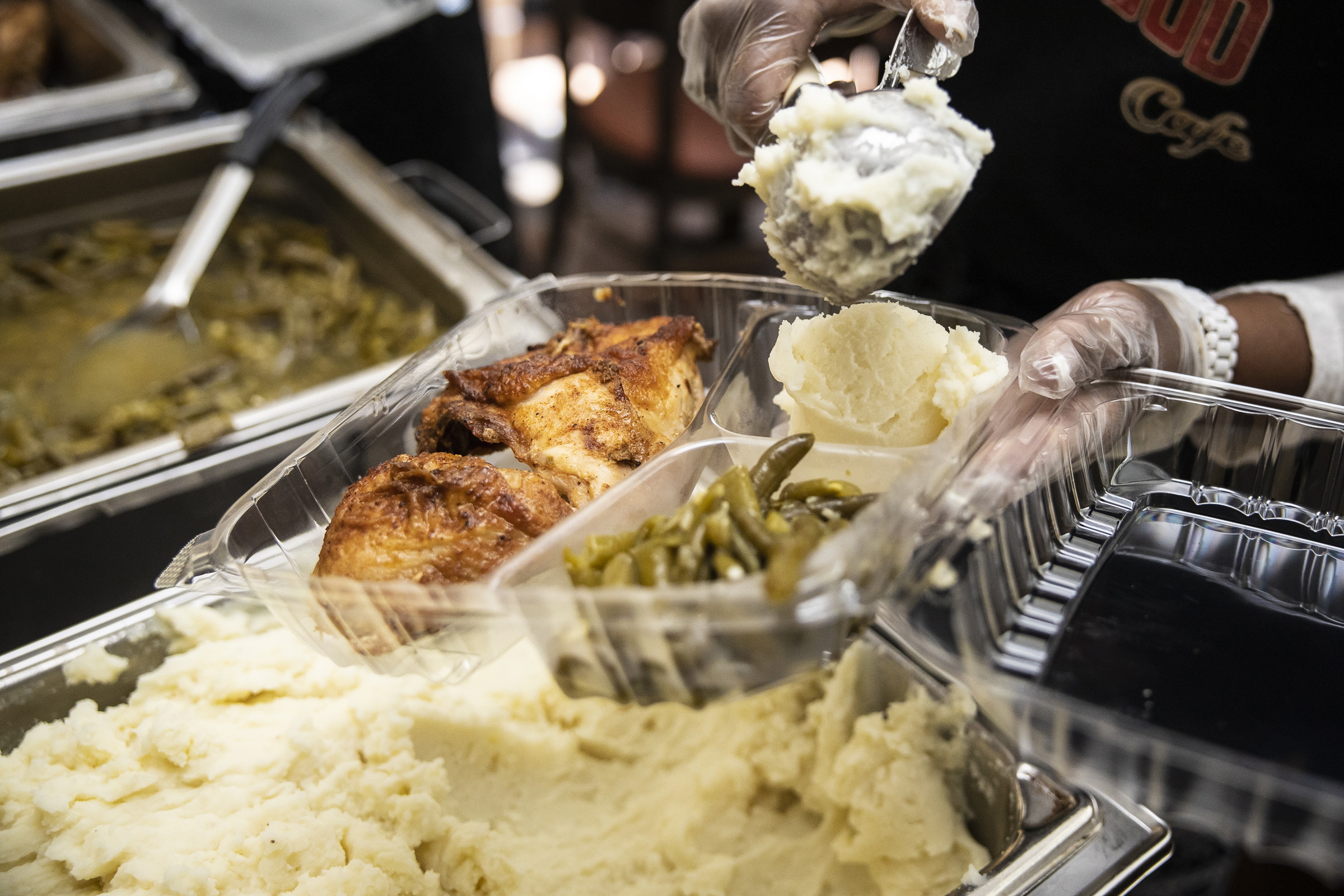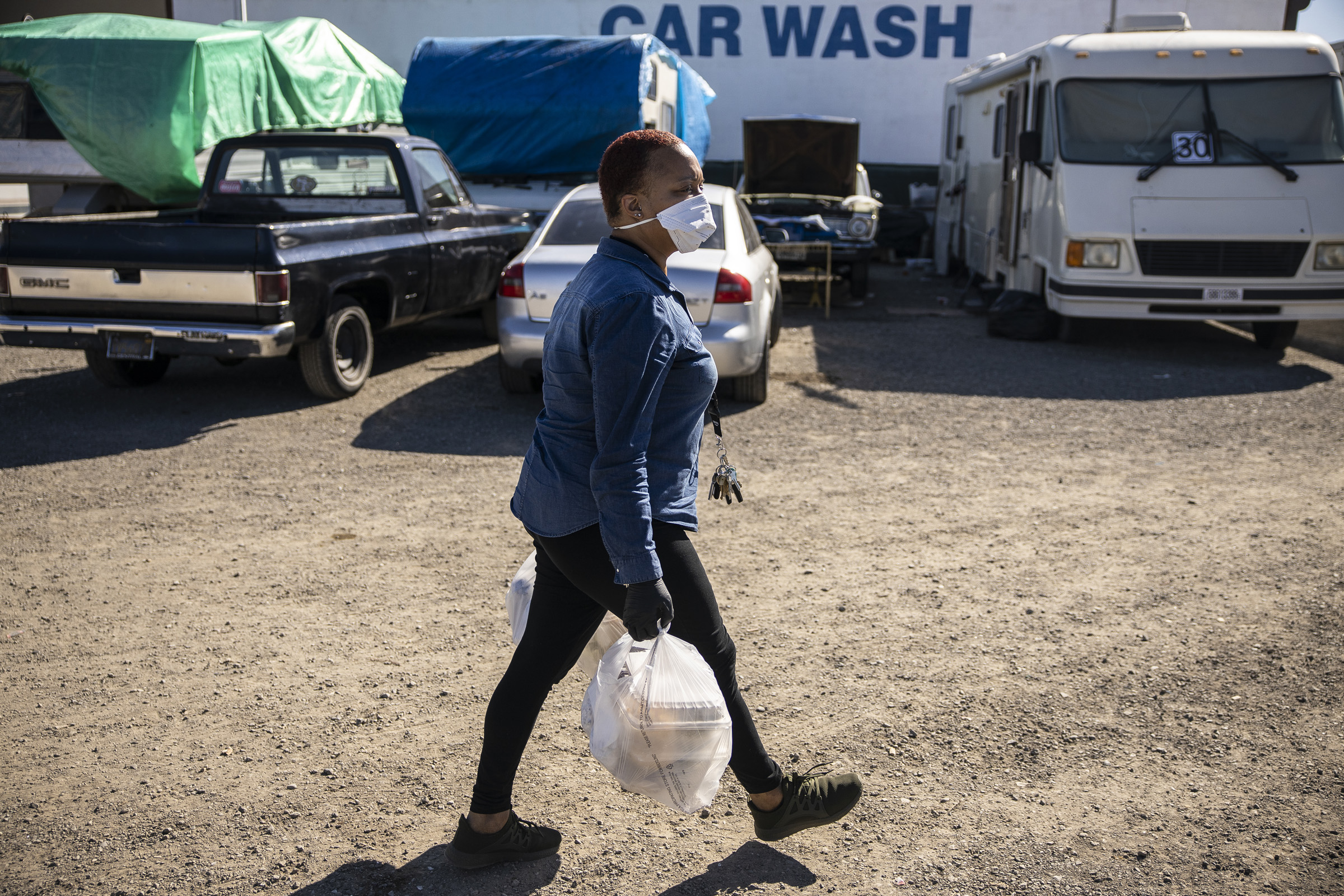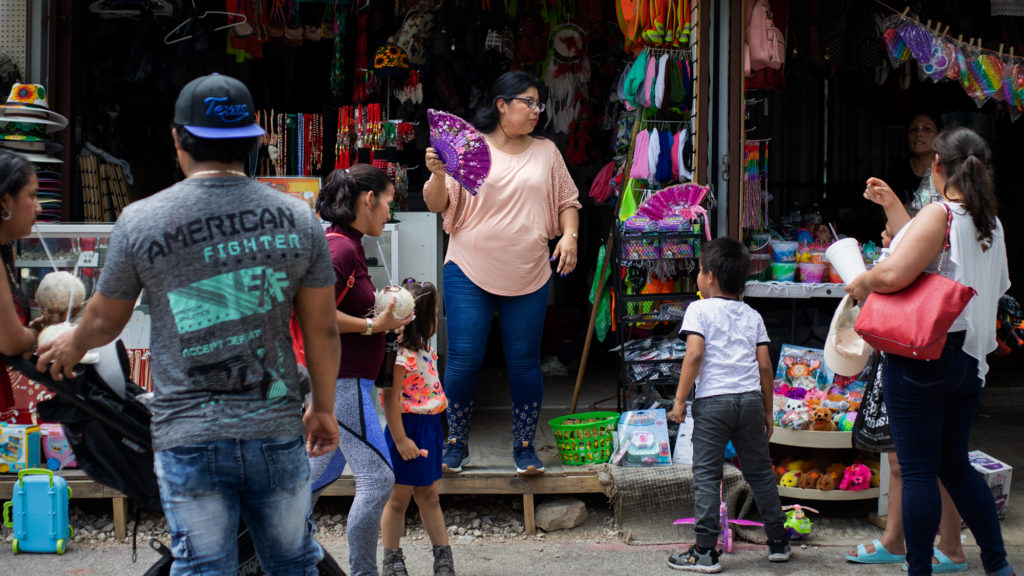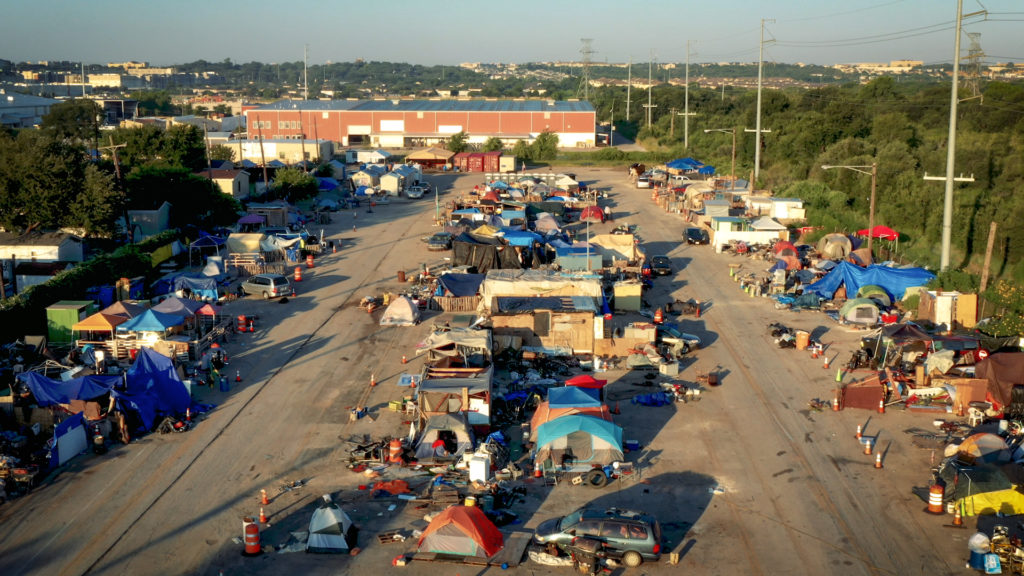Donations crowd The East Oakland Collective’s three-room office with bins of hot meals, stacks of water bottles, packets of cereal, reusable grocery bags, bulk boxes of Vitamin C tablets — all of this donated directly from local businesses and neighbors, and much of it coming from the collective’s Amazon wish list.
Of these many donations, only 250 bottles of hand sanitizer came from government agencies, and those were gone in two days, says Candice Elder, the Collective’s founder and CEO. “Before we receive any government assistance, the community helps.”
Elder started The East Oakland Collective (EOC) six years ago to assemble like-minded residents wanting to address generations of racial and economic inequality in the historically black and increasingly gentrified area of Oakland. To do this, the organization applies a holistic approach — providing regular meals to the area’s low-income and unhoused population, advocacy against invasive urban development, and lending circles to build wealth within the community.
But the arrival of COVID-19 has made it more difficult to fight the systemic inequities impacting East Oakland. In fact, the pandemic only affirms the pernicious effects of disparities in health care funding and access, employment, incarceration, and education.
Both African Americans and Latinos, who together comprise more than 80 percent of East Oakland’s population, are experiencing disproportionate rates of hospitalization and death related to COVID-19, and both groups are experiencing higher rates of unemployment as the economy slows to unprecedented levels. More than two-thirds of Oakland’s COVID-19 cases are located in East Oakland, making it the hardest-hit area in Alameda County.
Despite mounting challenges, The East Oakland Collective is seeing greater mobilization, greater engagement, and certainly greater need. “We have seen that food insecurity and supply insecurity has increased within our senior age group, as well as the disabled, who are shut in their homes and can’t leave, as well as folks with compromised immune systems,” says Elder.
To address the surging need, EOC’s offices have become a make-shift distribution center where people and organizations from around the Bay Area come to drop off donations while volunteers sort and deliver.
Office walls are covered in colorful chart paper, where scribes map out needs in the community, delivery routes, to-do lists, and contact information. Phones are ringing almost nonstop as more people learn about EOC’s outreach, and Elder just hired a remote receptionist to help manage the influx of requests.
Before the onset of the COVID-19 pandemic, the collective was focused primarily on feeding the area’s unhoused population by sourcing leftover food from tech companies in Silicon Valley and redistributing 400 meals per week to unhoused residents, an effort Elder calls “food reparations.”
The collective’s Feed the Hood events, which happened every other month, drew hundreds of volunteers of all ages, races, and income levels to pack boxed lunches, winter bags, and hygiene kits that were delivered by volunteers to nearby homeless encampments.
But with tech companies working from home and large gatherings banned since mid-March, EOC is now running a non-stop food and hygiene supply distribution operation, delivering 1,000 meals a week, and expanding their deliveries to include not just the homeless, but also those who are disabled, elderly, or immunocompromised.
“It’s a unified front of like-minded people coming together to do what is needed to save ourselves. For the people, by the people,” says Nicole Bratton, a member of The East Oakland Collective, as she helps pack bags for delivery.
Left: Pastor Josh McPaul in front of Oakland City Church. “We’ve sought to be an intensely multiethnic, but more than that, an intensely anti-racist community,” says McPaul. Right: Workers at Lena’s Soul Food in East Oakland prepare meals for distribution. [Photos by Martin do Nascimento]
Restaurants and other partners have been crucial to the increased support EOC is spreading across the neighborhood. Pastor Josh McPaul of Oakland City Church, which has partnered with EOC for the past four years, is now raising money to purchase hot meals from local restaurants, like Lena’s Soul Food, to contribute to EOC’s growing response to the pandemic.
Located at the edge of East Oakland, the church attracts a multi-ethnic and anti-racist congregation, McPaul says, and their partnership with EOC is a natural extension of its members’ values. By activating its network during the COVID-19 pandemic, Oakland City Church raised more than $40,000 in just three weeks.
“It’s really about committing to the people who actually live here in the neighborhood,” says Pastor McPaul. “We have a lot of people in our church who are aware that maybe they’re part of gentrification, and they see the impact of that and want to at least mitigate some of the effects of gentrification in the community they see around them.”
EOC’s efforts reach beyond just food delivery — the organization has been fighting city “sweeps” of homeless encampments, a police practice that forces unhoused people to relocate their belongings, even during a deadly pandemic, or else have their possessions trashed or destroyed. Elder and other EOC members are also pushing for increased emergency housing for homeless people who need safe places to isolate or quarantine.
Even in the midst of the group’s tireless work to support the most vulnerable members of East Oakland, EOC says its own volunteers have experienced the same racial bias that has disadvantaged residents in East Oakland for generations.
On April 24, several volunteers were pulled over by Oakland police officers after delivering supplies and checking homeless residents into hotel rooms. With seven police cars parked in the EOC lot, officers dragged one volunteer from the vehicle and pinned him face-down in the parking lot.
Police initially cited an unsafe lane change, but Elder says police later explained they were looking for a suspect wanted for a violent crime. The volunteer was not the suspect in question, but police arrested him nonetheless when they realized he was on probation and had a warrant for failure to appear in court.
Elder filmed the event with her cell phone camera, and says the chief of police later apologized to her, but not the volunteers affected.
“Apology is not sufficient,” Elder says. “We need changed behavior by the law enforcement. We need our communities and people of color to not be profiled. We need our essential workers who are doing essential business to not be tailed, targeted, and harassed. We’re not going to let the police stop our work. It would be an abomination to our community if we did so.”
Police interactions with the black community have, in the past week, ignited nationwide demonstrations, and The East Oakland Collective is now providing protective supplies to demonstrators in Oakland who are calling for an end to police brutality. They are joined by thousands of others in cities across the country who have come out in force to protest the murder of George Floyd by Minneapolis police officer Derek Chauvin.
In Oakland, those marches have passed within miles of EOC’s front door, only adding to the growing list of needs EOC is working to address. But the demonstrations also draw greater attention and momentum to the issues EOC has been working for years to reform.
“Feeding people has been a way for us to stay engaged,” Elder says. “We are going to people’s doorsteps. We’re having conversations. When there’s a need, we try to find a way to address it.”

